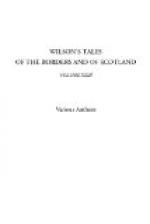“Never drew breath, you say, nurse!” resumed Mr. White, with an air of astonishment; “why, I have been given to understand, not only that the child was born alive, but that it is actually living now.”
“Weel,” replied the nurse, “maybe St. Cuthbert has wrought a miracle, and brought the child out o’ the grave by the West Church; but he has wrought nae miracle on me, to mak’ me forget what my een saw, and my hands did, that day when I helped to place the dead body o’ the innocent on the breast o’ its dead mother; ay, and bent her stiff arms sae as to bring them ower her bairn, just as if she had been faulding it to her bosom. And sae in this fashion were they buried.”
“And you would swear to that, Mrs. Temple?” said the writer.
“Ay, upon fifty Bibles, ane after anither,” was the reply, in something like a tone of triumph.
Nor could the woman be induced to swerve from these assertions, notwithstanding repeated interrogations; and the writer was left to the conclusion—which he preferred, rather than place any confidence in the funeral letter—that the nurse’s statement was in some mysterious way connected with the visit of Isabel Napier; and yet, not so very mysterious, after all, when we are to consider that her brother was preparing to claim Eastleys, as well as the valuable furniture of the house in Meggat’s Land, as the nearest lawful heir of his deceased uncle. The salvo was at least comfortable to both Mr. White and his client, and no doubt it helped to lighten their steps, as, bidding adieu to the “hard witness,” they left her to the nursing which comes “aye hame in the end.”
But their inquiries were not finished; and retracing their steps up the Canongate, they landed in the Fountain Close, where, under the leading of Mrs. Hislop, the writer was procured another witness, with a name already familiar to him through the communication of his client; and this was no other than that same Jean Graham, who was sent to Toddrick’s Wynd on that eventful night, fifteen years before, to bring Mrs. Hislop to the house in Meggat’s Land;—one of those simple souls—we wish there were more of them in the world—who look upon a lie as rather an operose affair, and who seem to be truthful from sheer laziness. There was, accordingly, no difficulty here; for the woman rolled off her story just as if it had been coiled up in her mind for all that length of time.
“There was a terrible stir in the house that night,” she began. “The nurse, wha is yet living in Lochend Close, and Mrs. Kemp the howdie, wha is dead, were wi’ my lady; and John Cowie, the butler, was busy attending our master, who had been the haill day in ane o’ his dark fits, for we heard him calling for Cowie in a fierce voice ever and again; and his step sounded ower our heads upon the floor as he walked back and fore in his wrath. Then I was sent for you, and brought you, and you’ll mind how Cowie bade me go along; but I had mair sense,




